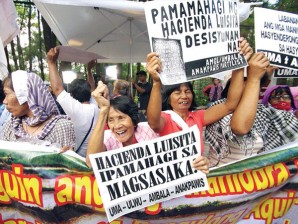
‘THIS IS IT’ Farmers from Hacienda Luisita erupt in celebration in Baguio City after the Supreme Court affirmed its ruling ordering the total distribution of the sugar estate owned by the family of President Aquino and pegging the land value at 1989 prices. RICHARD BALONGLONG / INQUIRER NORTHERN LUZON
BAGUIO CITY—The Supreme Court rejected with finality a bid by the family of President Benigno Aquino III to secure at least P5 billion in compensation for its Hacienda Luisita, affirming a ruling last November basing the value of the sugar plantation at around P196 million on 1989 prices.
The court voted 8-6 with one abstention in the decision described as a “litmus test” of the government resolve to implement a Comprehensive Agrarian Reform Program launched by Mr. Aquino’s mother, Corazon Aquino, after she took power following a People Power Revolution that ousted the dictator Ferdinand Marcos in 1986.
Briefing reporters in this resort capital, where the high tribunal is holding its summer session, spokesperson Midas Marquez said the court ruling was “final and executory.” He said the court would no longer entertain further pleadings and motions for reconsideration on the dispute that had taken 27 years to resolve.
The Supreme Court, sitting en banc, also ruled that the Luisita farmers may pay amortization fees for the next 30 years, according to the 1989 land values for the 4,915-hectare estate when Hacienda Luisita Inc. (HLI) struck a deal in which management offered a stock distribution option (SDO) in lieu of outright land distribution.
In a ruling last November 22, the court rescinded the SDO and voted 14-0 to distribute the hacienda.
Chief Justice Renato Corona and Associate Justices Presbitero Velasco Jr., Arturo Brion, Teresita Leonardo-de Castro, Roberto Abad, Jose Perez, Jose Mendoza and Martin Villarama Jr. voted for the 1989 valuation, Marquez said.
Voting against were Associate Justices Lucas Bersamin, Maria Lourdes Sereno, Mariano del Castillo, Diosdado Peralta, Estela Perlas-Bernabe and Bienvenido Reyes. In the Nov. 22 decision, Sereno, Mr. Aquino’s first appointee to the high tribunal, batted for a 2006 valuation, echoing the position of the HLI management.
As in previous court deliberations on Hacienda Luisita, Associate Justice Antonio Carpio inhibited himself from the case, Marquez said.
President Aquino’s spokespersons declined comment on the decision, saying it was up to the Department of Agrarian Reform and the solicitor general to issue a reaction.
Antonio Ligon, HLI spokesperson, said: “We have always believed that the purpose of the law is ultimate justice and equal rule for everyone. The application of the law in this case is no exception. The majority of the justices have spoken. HLI shall abide and will comply with what is required by the decision.”
Ligon said the farmers who decided in 1989 to acquire stocks in HLI must accept the court’s final ruling.
Tuesday’s decision dismissed HLI’s motion to clarify and reconsider its Nov. 22 ruling, which junked the SDO and ordered the distribution of land to farm workers. It set the 1989 market price for Hacienda Luisita land as a basis for computing just compensation at P40,000 per hectare, then placed at P196 million by HLI.
HLI, however, asked the court to peg the value of the land at its fair market value in 2006, when then Agrarian Reform Secretary Nasser Pangandaman issued the “notice of coverage” for the sugarcane plantation.
HLI didn’t give estate’s price
Ligon said at that time land value in the area was around P100 per hectare. That adds up to a total of P4.9 billion. But he said there were other considerations as well—income generation, productivity, among others, and that HLI had not placed a ball park figure for the entire estate up for distribution.
Lito Bais, president of the United Luisita Workers Union (Ulwu), said the value of the property was important to farmers because it would determine how much they would need to pay the government in 30 years. Bais, who went to Baguio with around 20 Ulwu members, said the decision meant that each hectare of farmland would now cost P40,000.
Members of Ulwu and the Association of Original 1989 Farmworkers of Hacienda Luisita sent their representatives to the high court’s summer compound in Baguio on Tuesday to await the decision.
Lawyer Jobert Pahilga, counsel for the Alyansa ng mga Manggagawang Bukid sa Asyenda Luisita, said the DAR must now buckle down and process the distribution of Luisita land, saying the agency could fulfill this in six months.
Pahilga also said that, while the court’s Tuesday decision should qualify as a landmark ruling, the justices still needed to qualify whether the ruling is “nunc pro tunc,” a legal term stipulating that the ruling could not be used as basis or a precedent for similar cases.
He said various courts were addressing 13 other agrarian reform cases requiring them to determine whether farmers should avail themselves of SDO, like the Hacienda Luisita farmers, before Tuesday’s ruling, or whether they should also acquire lands instead. With reports from Vincent Cabreza and Desiree Caluza, Inquirer Northern Luzon, and Jo Martinez-Clemente and Tonette Orejas, Inquirer Central Luzon